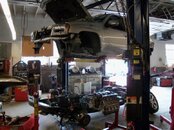Perhaps get an apecs reg course adn be certified and do your own. I would think that over 10 years teh course will pay for itself and teh kits are probbly 10-15 each if you know the right source. my mk25's i think is 9-13 eACH.
Bulk opinion on this post makes perfect sense but is there any sense in maintaining manufacturer warranty on regs? I dive Apeks and if I do not service them every year then I loose the free parts. My reg sees 25 - 50 dives a year and I am wondering if it needs annual service after so little usage. Also makes me wonder if I should bail out of the free service just to save money on longer service intervals?




